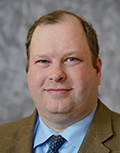
Learning in Tragedy-Time
On February 17 the Wabash community got word that police were on the campus looking for a suspect in a double murder. As it turned out, the suspect was an employee. He had taken a college van, and later ended his life as police were about to apprehend him. He was not especially well-known by students (or, for that matter, by a large portion of his coworkers) but it is still a very frightening and worrisome thing to be a student in a classroom and suddenly have dozens of assault rifles carried by police in your midst.
Wabash College Statement
The Bachelor "Unthinkable Tragedy"
Wabash College Chapel Talk - Dr. Derek Nelson (February 18, 2016)
The day after the lockdown at Wabash I gave a short talk in the Wabash chapel to some students and colleagues. Wabash has never been affiliated with a church body (though it was more or less informally Presbyterian for quite some time). The Chapel functions as a kind of safe space for people, the site of occasional worship services, but more usually for lectures and ceremonies. The regularly scheduled time happened to be the morning after the lockdown, so it was a natural occasion for a faculty person to say something that might help the community move forward in its coming to terms with the tragedies of the previous day.
 In thinking about what I might say and how the events of the previous day related to classroom teaching, there were two things that emerged as priorities for me. First was to try to verbalize as many as possible of the feelings and perspectives I had been hearing. It helps students, especially, to hear a professor say “Some of you might be feeling X, others of you Y, still others Z.” Even if it feels kind of forced and obvious, getting the basics on the table is important for starting a conversation about a tragedy, and it also can serve as a springboard for talking about relevant course material, as well.
In thinking about what I might say and how the events of the previous day related to classroom teaching, there were two things that emerged as priorities for me. First was to try to verbalize as many as possible of the feelings and perspectives I had been hearing. It helps students, especially, to hear a professor say “Some of you might be feeling X, others of you Y, still others Z.” Even if it feels kind of forced and obvious, getting the basics on the table is important for starting a conversation about a tragedy, and it also can serve as a springboard for talking about relevant course material, as well.
I learned several things from a previous tragedy. A young man was injured (he sustained a concussion) in football practice at a college where I taught and served as chaplain. He died two days later from the injury. The coaches brought in a variety of people to address the team, including me. I laid it on very thick, I realize in retrospect. “I can’t imagine how awful you must feel.” “I bet you’re all wondering whether it’s worth it to keep going out there and risking your life.” And so on. Well as it turns out, I was mostly just projecting my fears and worries onto them. In fact, virtually none of the players was feeling that way, because it was only the second week of practice, the deceased was a freshman, and almost none of the players even knew his name. So my overcompensation ended up making many students feel emotionally inadequate or worse for not feeling sufficiently “overwhelmed.” Therefore in talking with students I try to stress that, for the time being, at least, wherever they are emotionally is a perfectly legitimate place to be.
Secondly, I wanted to highlight the fact that our colleges are bubbles, the academy is an unusually safe subset of the American landscape, and that the temptation is to see a traumatic incident like a lockdown or a live-shooter episode as a shocking interruption into our normal reality. But in fact we mislead ourselves to think this. There is not a “normal” world that is absent any crisis or violence. That stuff is literally all over the place.
A number of students I talked with felt like the tragedy “put things into perspective.” I can affirm that in one sense, but not in another. Yes, the deaths of innocent people and the terror of a SWAT team walking into your room does make one’s other problems and worries seem trivial. But on the other hand, I thought students needed to think harder about whether their education being “put into perspective” could really mean that it wasn’t so important after all. On the contrary, I think that what one is studying should take on heightened importance when one thinks about it in relation to an obviously troubled and hurting world.
Such occasions therefore become opportunities, perhaps especially for teachers of religious studies and theology, to connect students at a fragile-but-teachable moment to the subject matter of our courses.